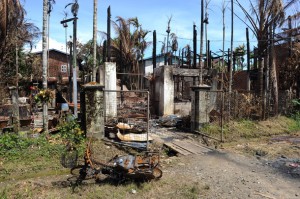Fresh Violence in Arakan State Belies Government’s Disingenuous Assurances to UN Human Rights Council
By Burma Partnership • October 7, 2013 A resurgence of inter-communal violence in Arakan State on 1 and 2 October has left six Muslims dead and dozens of homes destroyed, with mobs setting fire to houses in several villages in Sandoway Township just hours before President Thein Sein was due to arrive for an official visit to the beleaguered region. Calm has now been restored, but suspicions and tension remain between Muslims and Buddhists, while nearly 500 people have been left homeless and many others reportedly injured or missing.
A resurgence of inter-communal violence in Arakan State on 1 and 2 October has left six Muslims dead and dozens of homes destroyed, with mobs setting fire to houses in several villages in Sandoway Township just hours before President Thein Sein was due to arrive for an official visit to the beleaguered region. Calm has now been restored, but suspicions and tension remain between Muslims and Buddhists, while nearly 500 people have been left homeless and many others reportedly injured or missing.
What differentiates this latest outbreak of violence from previous ones is that this time the ethnic Rohingya, who bore the brunt of the violence in June and October 2012, were not on the receiving end. Rather, according to local NLD representative Win Laing, “They are Kaman [Muslims], they are ethnic nationals—not outsiders.” Yet, despite evidence to the contrary, namely that the victims were of a different ethnicity this time and that Buddhist gangs initiated the violence, the government line is that so-called illegal Muslim immigrants – or Rohingya – are to blame for the violence. “Bengali people wanted to create violence now,” claimed Win Myaing, Arakan State government spokesperson.
It would seem therefore that the Burma government is trying to do two things: first, portray victims as aggressors in an effort to blame Muslims for their own suffering, and second, claim that all Muslims involved in the violence are Rohingya, in an attempt to play on endemic fears of so-called illegal immigrants and thereby paint the violence in a more palatable light for a domestic audience. In reality, however, last week’s events indicate that a more general anti-Muslim violence has now taken root, perhaps inspired by the anti-Muslim violence which has flared up across Burma in recent months, and which, ironically, was sparked by the original anti-Rohingya violence in Arakan State in 2012.
In his statement on 13 September at the 24th session of the UN Human Rights Council in Geneva, Burma’s Minister for Foreign Affairs Wunna Maung Lwin reassured his audience that the situation in Arakan State was “gradually returning to normalcy” and that there is “no reason to harbour security concerns for anyone in [Arakan] State.” Just as it spins facts for its domestic audience, so the Burma government is spinning the narrative that it wants the international community to hear, namely that things are under control in Arakan State. Nothing could be further from the truth. This recent outbreak of violence shows that serious inter-communal and inter-religious violence is spreading and that the authorities are not doing enough to prevent it.
In fact, as with all previous outbreaks of anti-Muslim violence in Burma over the last 18 months, sinister reports have surfaced that the security forces and local authorities in Sandoway Township have done little, if anything, to quell the violence and stop it from spreading, and even that the authorities are complicit in the violence. Indeed, discriminatory and draconian laws, the segregation of communities based on religion and/or race, and the unequal pursuit of Muslim over Buddhist perpetrators of violence, support such allegations.
However, according to Wunna Maung Lwin, the “communal violence should not be portrayed or construed as religious or racial conflict.” Yet the fact that violence in Arakan State has been perpetrated against whole communities for the sole reason that they are Muslim – and in many cases Rohingya – allows for little other interpretation. In fact, the International Crisis Group released a report on 1 October saying that more clashes between Buddhists and Muslims were likely because of “the depth of anti-Muslim sentiment […] and the inadequate response of the security forces.” Such analysis adds to recent warnings by Physicians for Human Rights, the Sentinel Project for Genocide Prevention and the United States Holocaust Memorial Museum of the worsening situation for the Rohingya in Arakan State. Such groups highlight the “ghettoization” of the Rohingya in internally displaced persons camps, restrictions on humanitarian aid access, ethnic cleansing and even incipient genocide.
The human rights of Muslim and Rohingya communities are simply not recognized in Arakan State. The situation is dire for them and threatens to get a lot worse. While one cannot blame the Burma government for all violence that occurs on its watch, it must bear a heavy responsibility for failing to do its utmost to quell any violence and to bring perpetrators to account, while the international community and the political opposition must condemn in the strongest possible terms any corroborated reports of authorities and security forces cooperating with mobs and assailants. The international community must look beyond Wunna Maung Lwin’s statement with full vigilance and pressure the Burma government, including through the upcoming UN General Assembly resolution, to take immediate action to protect the rights of communities and peoples under attack. Otherwise Burma will face a grave humanitarian and human rights crisis that will undermine the government’s legitimacy, threaten its incipient political and economic reforms, and affect countries and communities across ASEAN.
Tags: Arakan/Rakhine, Burma Partnership, Muslims, Rohingya, United Nations, ViolenceThis post is in: Blog
Related PostsMyanmar: Free Prisoners of Conscience in Rakhine State End Ongoing Persecution of Rohingya
UN Myanmar Rights Expert: Backtracking on Democratic Space Gains Momentum in Election Year
Myanmar’s Proposed Race and Religion Laws are Discriminatory and should be Scrapped
The FCO’s Human Rights Work 2013
BROUK Welcomes US Senate Resolution on Rohingya









 All posts
All posts